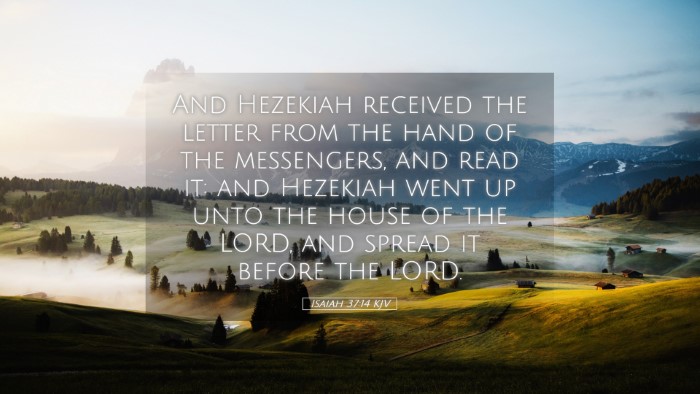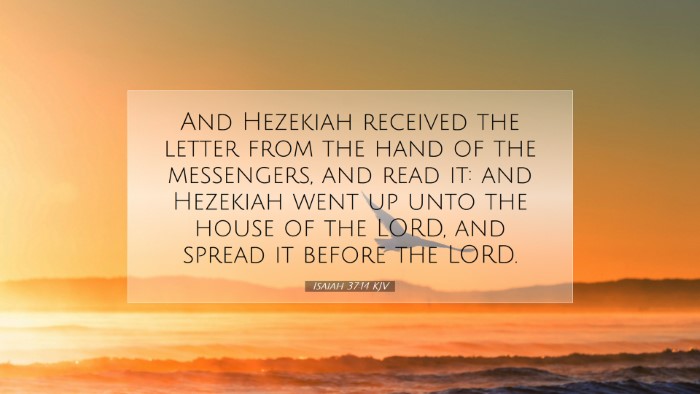Commentary on Isaiah 37:14
Isaiah 37:14 reads:
"And Hezekiah received the letter from the hand of the messengers and read it; and Hezekiah went up to the house of the Lord and spread it before the Lord."
Contextual Background
This verse occurs within a crucial moment in the narrative of the Assyrian invasion during King Hezekiah's reign in Judah. Sennacherib, the king of Assyria, had sent a letter filled with threats and blasphemies against the God of Israel. Hezekiah’s response to this letter illustrates profound faith and devotion.
The King's Response: A Lesson in Leadership
Commentators such as Matthew Henry highlight Hezekiah's immediate response to the dire situation. He did not turn to earthly strategies or allies, but instead sought the Lord. This response emphasizes a critical principle for leaders:
- Dependence on God: When faced with adversities, Hezekiah exemplifies the necessity of relying on God, showcasing a model for spiritual leaders.
- Seeking God’s Guidance: His act of going to the house of the Lord illustrates the importance of prayer and seeking divine direction in moments of crisis.
Prayerful Act: Spreading It Before the Lord
Hezekiah’s action of spreading the letter before the Lord is rich in meaning. According to Adam Clarke, this signifies:
- Transparency in Communication: Hezekiah presents his concerns directly to God, showcasing a heart unreserved in petition.
- Faith in God’s Sovereignty: By laying the letter out, Hezekiah demonstrates trust that God will deal with his adversaries according to His will.
Theological Implications
The verse invites theological reflection on God’s involvement in human affairs. Albert Barnes remarks that the act of prayer is not merely a human response but an essential component in God’s redemptive plan.
- God's Omnipotence: The situation with Sennacherib illustrates God’s supreme authority over nations.
- Intercession: Hezekiah's prayer reflects the priestly role that leaders are called to undertake for their people.
Contrast with Unbelief
Hezekiah's response stands in stark contrast to the discourse of doubt prevalent among some of his advisers and the fear that could have paralyzed the nation. Particularly, Matthew Henry points out that while the Assyrians trusted in their might, Hezekiah's trust in God exposes the folly of relying on human strength.
Lessons for Modern Readers
This passage serves as a powerful reminder for pastors, students, theologians, and Bible scholars today:
- Faithful Leadership: Leaders are called to model dependency on God amidst crises.
- The Importance of Prayer: Engaging sincerely in prayer is crucial in decision-making processes.
- God's Faithfulness: The Lord's recorded response to Hezekiah’s plea assures us of His commitment to His covenant people.
Conclusion
Isaiah 37:14 encapsulates a moment of profound faith and earnest supplication. Through the example of Hezekiah, we find both a model of spiritual leadership in times of distress and an invitation to deepen our reliance on God. As modern believers face diverse challenges, the imperative to spread our concerns before the Lord remains as relevant today as it was in the days of the prophets.


